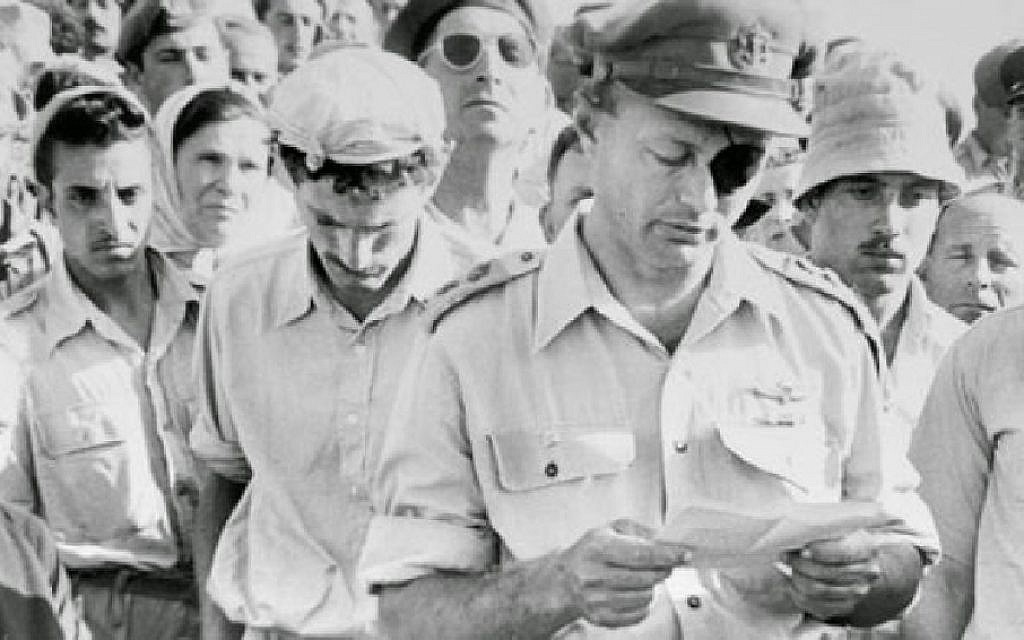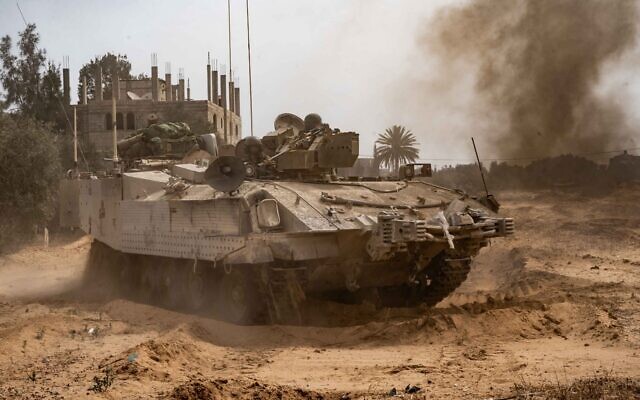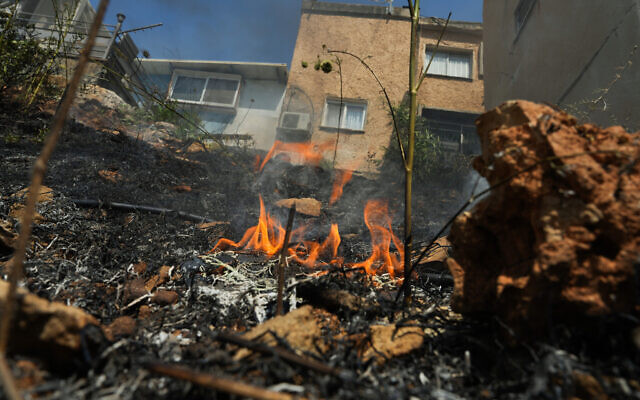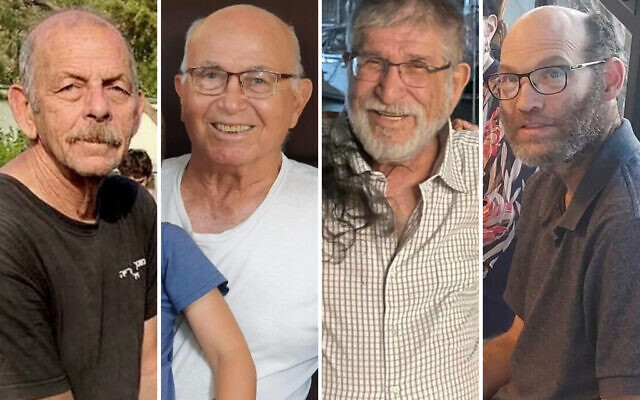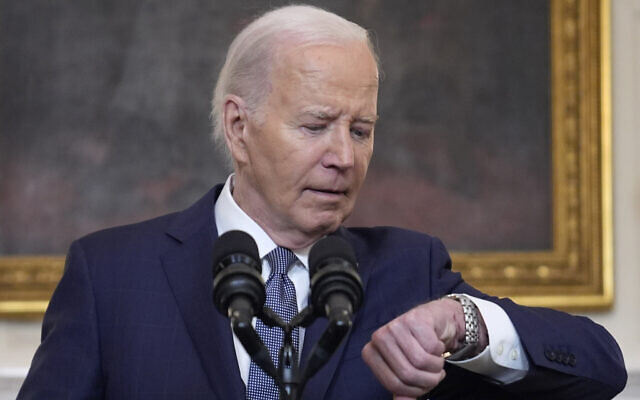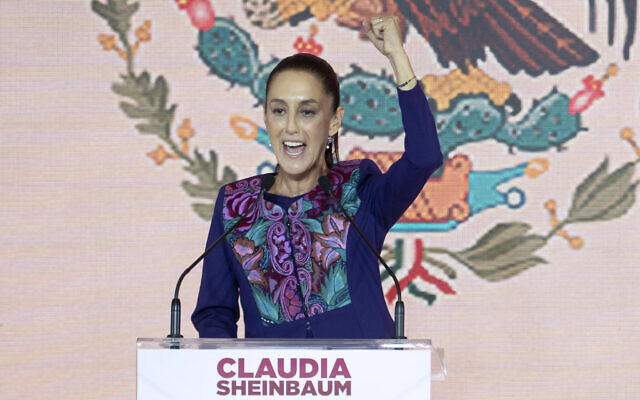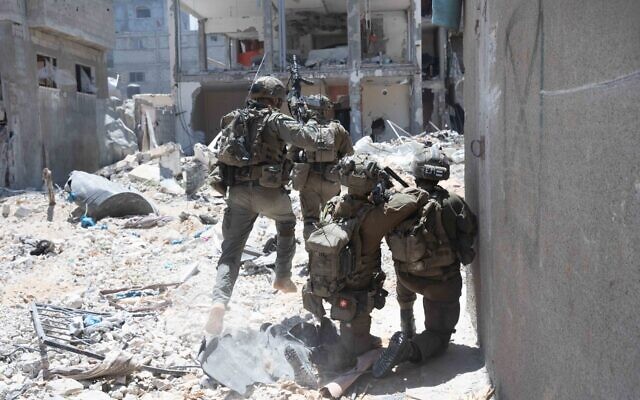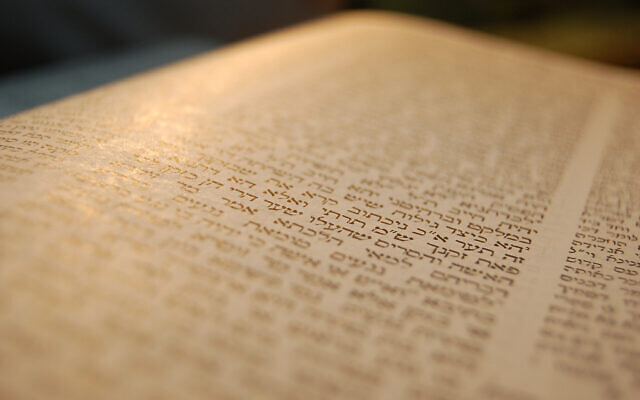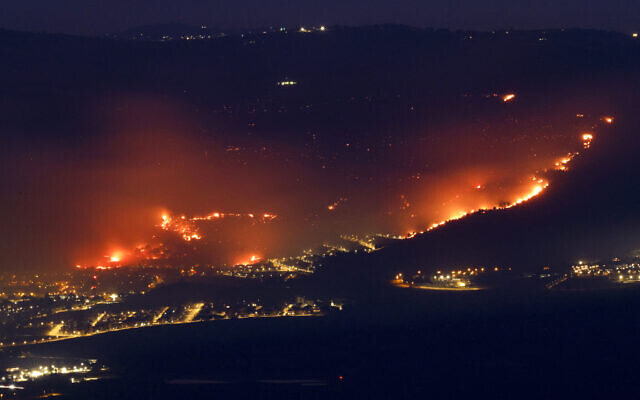When Moshe Dayan delivered the defining speech of Zionism
60 years ago, as he eulogized a ‘thin blond lad’ named Roi Rotberg killed by Palestinian gunmen on the Gaza border, the IDF chief of staff wasn’t aiming to set out the Zionist ethos for generations. But that’s what he did
Sixty years ago, on April 28, 1956, Moshe Dayan met Roi Rotberg. Rotberg was 21 and fair-haired and had moved from Tel Aviv to Nahal Oz, a kibbutz planted a single mile from the Gaza border. Dayan was the army’s top commander at the time. He had come to visit the relatively new community, which was preparing for four weddings on the Jewish festival of Lag Ba’omer. Rotberg, a young officer, was in charge of the kibbutz’s security. The two reportedly got along.
And so, the following day, when Dayan learned that Rotberg had been murdered by the border — drawn out on horseback, alone, by Palestinian gunmen in a nearby wheatfield and then killed and mutilated and dragged to the Gaza side of the border — he went into his room and wrote a eulogy. It took him half an hour.
His chief of staff, Mordechai Bar-On, told Haaretz in 2011 that he often helped army commanders with their speeches, “but Dayan knew how to write better than I did.”
English editions of this text exist. The ones I’ve seen, though, are flattened, stripped of the colorful Hebrew and the crispness of speech, sapped of the unique and now expired blend of a language that had lived dormant in prayer and ritual for thousands of years and was then fed into the mouths of those, like Dayan, who were born in the land and grew up speaking a reinvigorated language that still rested squarely on the Bible.
‘The millions of Jews, annihilated without a land, peer out at us from the ashes of Israeli history and command us to settle and rebuild a land for our people. But beyond the furrow that marks the border, lies a surging sea of hatred and vengeance, yearning for the day that the tranquility blunts our alertness, for the day that we heed the ambassadors of conspiring hypocrisy, who call for us to lay down our arms’
I, too, found no way to accurately alert the reader to the images of Gaza from the Book of Judges, evoking Samson and the harlot and the city’s gates which he tore off their hinges and shouldered nearly to Hebron; and to the significance of the word Dayan chose when depicting the blade that killed Rotberg — ma’achelet, the knife that Genesis tells us Abraham raised over the bound body of his son Isaac.
What Dayan intended was to eulogize a single fallen comrade. Maybe also to send a message to prime minister David Ben-Gurion, in advance of the 1956 War, about the need for a full-scale operation against the constant flow of Egyptian and Palestinian terror from Gaza. Instead, he penned an ethos that is succinct and brutal, pessimistic and defiant, unapologetic and, tragically, more important to the understanding of Israel today than are large swaths of the state’s own Declaration of Independence.
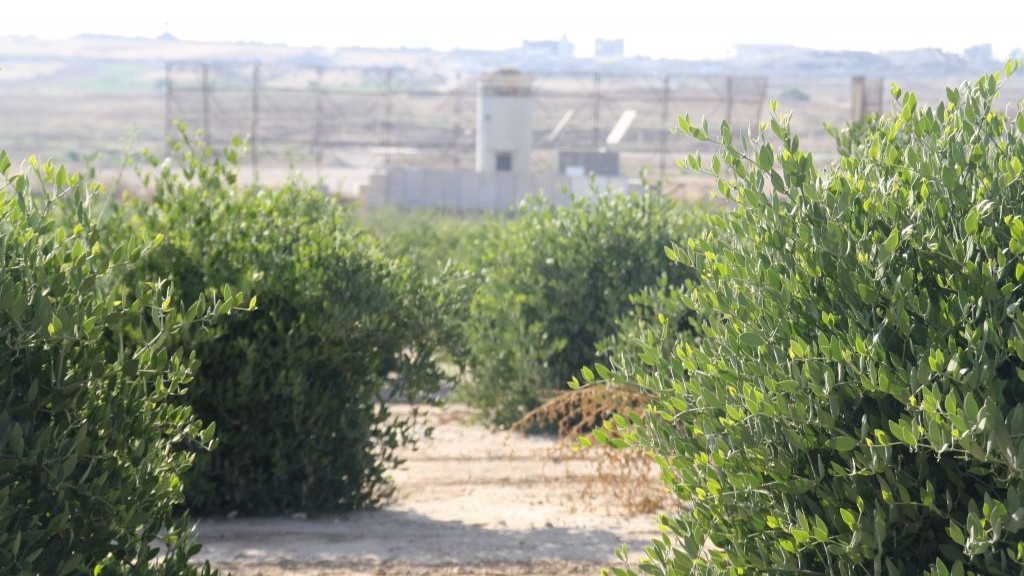
What follows is a translation of the written text. The one spoken over the grave was even shorter – a mere 285 words in the original Hebrew – and can be heard here.
Yesterday with daybreak, Roi was murdered. The quiet of a spring morning blinded him, and he did not see the stalkers of his soul on the furrow. Let us not hurl blame at the murderers. Why should we complain of their hatred for us? Eight years have they sat in the refugee camps of Gaza, and seen, with their own eyes, how we have made a homeland of the soil and the villages where they and their forebears once dwelt.
Not from the Arabs of Gaza must we demand the blood of Roi, but from ourselves. How our eyes are closed to the reality of our fate, unwilling to see the destiny of our generation in its full cruelty. Have we forgotten that this small band of youths, settled in Nahal Oz, carries on its shoulders the heavy gates of Gaza, beyond which hundreds of thousands of eyes and arms huddle together and pray for the onset of our weakness so that they may tear us to pieces — has this been forgotten? For we know that if the hope of our destruction is to perish, we must be, morning and evening, armed and ready.
A generation of settlement are we, and without the steel helmet and the maw of the cannon we shall not plant a tree, nor build a house. Our children shall not have lives to live if we do not dig shelters; and without the barbed wire fence and the machine gun, we shall not pave a path nor drill for water. The millions of Jews, annihilated without a land, peer out at us from the ashes of Israeli history and command us to settle and rebuild a land for our people. But beyond the furrow that marks the border, lies a surging sea of hatred and vengeance, yearning for the day that the tranquility blunts our alertness, for the day that we heed the ambassadors of conspiring hypocrisy, who call for us to lay down our arms.
It is to us that the blood of Roi calls from his shredded body. Although we have vowed a thousand vows that our blood will never again be shed in vain — yesterday we were once again seduced, brought to listen, to believe. Our reckoning with ourselves, we shall make today. We mustn’t flinch from the hatred that accompanies and fills the lives of hundreds of thousands of Arabs, who live around us and are waiting for the moment when their hands may claim our blood. We mustn’t avert our eyes, lest our hands be weakened. That is the decree of our generation. That is the choice of our lives — to be willing and armed, strong and unyielding, lest the sword be knocked from our fists, and our lives severed.
Roi Rotberg, the thin blond lad who left Tel Aviv in order to build his home alongside the gates of Gaza, to serve as our wall. Roi — the light in his heart blinded his eyes and he saw not the flash of the blade. The longing for peace deafened his ears and he heard not the sound of the coiled murderers. The gates of Gaza were too heavy for his shoulders, and they crushed him.
Mitch Ginsburg has translated several works of nonfiction and fiction, including “Thera” by Zeruya Shalev, “The World of the End” by Ofir Touche Gafla, and “Second Person Singular” by Sayed Kashua.
Are you relying on The Times of Israel for accurate and timely coverage right now? If so, please join The Times of Israel Community. For as little as $6/month, you will:
- Support our independent journalists who are working around the clock;
- Read ToI with a clear, ads-free experience on our site, apps and emails; and
- Gain access to exclusive content shared only with the ToI Community, including exclusive webinars with our reporters and weekly letters from founding editor David Horovitz.

We’re really pleased that you’ve read X Times of Israel articles in the past month.
That’s why we started the Times of Israel eleven years ago - to provide discerning readers like you with must-read coverage of Israel and the Jewish world.
So now we have a request. Unlike other news outlets, we haven’t put up a paywall. But as the journalism we do is costly, we invite readers for whom The Times of Israel has become important to help support our work by joining The Times of Israel Community.
For as little as $6 a month you can help support our quality journalism while enjoying The Times of Israel AD-FREE, as well as accessing exclusive content available only to Times of Israel Community members.
Thank you,
David Horovitz, Founding Editor of The Times of Israel


